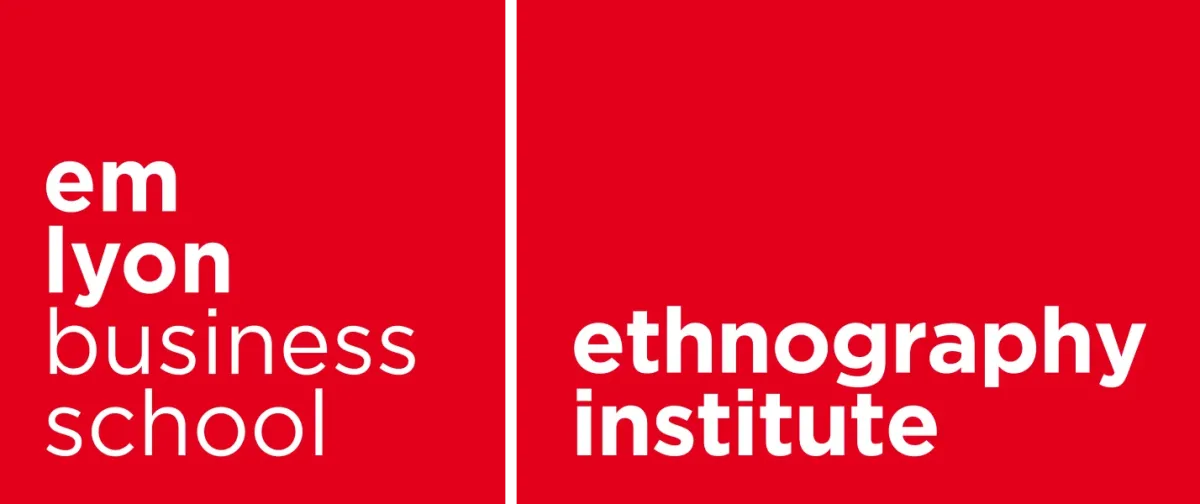Ethnography Institute - Our programs

Semester: C3 (2026). Duration: 8 weeks (7+1) Teaching Team: Guillaume Dumont (RP), Denis Giordano, David Courpasson. Location: emlyon, Lyon Campus. In-person.
Concept
The “Corporate Ethnography Track" offers participants a comprehensive and empirical approach to the new challenges of contemporary work environments through ethnographic methods. Ethnography produces detailed knowledge of contemporary socio-cultural phenomena through fieldwork. Once the domain of anthropologists studying unknown populations and then sociologists focusing on urban tribes in Western societies, ethnography today provides a disruptive and comprehensive view of the world. It relies on long, meticulous, and committed immersion to explain the meanings individuals give to their practices and thereby surpass discourse and opinion. It offers useful explanations based on in situ knowledge, not only of the company but also of the social worlds in which individuals live.
The ethnogtaphic approach is becoming increasingly important in a professional world where harmonizing work dynamics and processes requires intercultural understanding on two levels: first, managing collaborators with diverse expertise on complex projects (e.g., sales, developers, product managers, accountants); and second, identifying and responding precisely to the changing needs of clients. Consulting firms, for example, engage professionals trained in ethnography who can mobilize knowledge from anthropology and sociology, skills that are also in demand when soliciting expert reports on complex issues.
Objectives
Familiarize participants with the analysis of organizational processes and work dynamics they will encounter throughout their careers, regardless of their position or the industry involved.
Raise awareness of the key concepts of anthropological and sociological approaches in their practical application to the corporate context, providing a fresh and original perspective on managerial issues.
Equip participants with the necessary methodological tools (i.e., interviews, participant observation) and practical experience using them in various professional contexts through fieldwork.
Develop the participants' ability to construct ethnographic narratives that combine writing and multimedia content to communicate field results in an original and persuasive manner in a professional context.
Professional Domains
Services: Understand customer experience, appropriate the perspective of clients by recognizing their uniqueness, understand the hidden motivations informing decisions, produce appropriate human interactions.
Consulting: Detect and address company issues, define and understand the perspectives, expectations, and key questions of the client, provide an external view to formulate innovative and adapted solutions, and choose and adopt the appropriate posture.
Data Science and AI: Understand how data is produced, translate requests between different departments/experts, develop a critical viewpoint and an ethnographic perspective on its use, and link a business problem to a technical solution through business architecture.
Human Resources: Understand the needs, concerns, and expectations of employees, identify and analyze the underlying causes of inter- and intra-team conflicts, define and adopt a mediating role among different departments, and promote intercultural sensitivity.
Marketing: Identify cultural factors that impact consumer practices, translate these insights into actionable recommendations for product management, develop effective branding strategies, launch the product on the market, and analyze customer interactions.
Design: Understand the user’s view and the heterogeneity of their needs, identify the root of these needs in terms of function, translate this understanding into technical language, and assist users in contacting/using the product.
Program
Four new courses to develop theoretical and practical knowledge related to the challenges of corporate ethnography and its two reference disciplines, anthropology and sociology, as well as to use these insights in the field during an immersive company stay. These courses are particularly targeted at participants interested in the social sciences, human interactions, and social relations, seeking an alternative approach to more traditional subjects such as marketing, finance, accounting, or strategy, which will be examined through a fresh lens.
Corporate Ethnography - emlyon
Course 1 – Introduction to Ethnography (5AXS05) How to observe and document complex work situations? How to collect precise qualitative data and analyze it? How to formulate explanations grounded in the empirical reality of the company? How to make ethnographic insights tangible and comprehensible for different audiences (e.g., clients, collaborators, public institutions)? This course introduces fieldwork and the writing techniques specific to ethnography. To do so, it reviews the main field tools (e.g., participant observation, digital ethnography, interviews) by drawing on varied field experiences with novel interlocutors (e.g., impact investors, members of criminal organizations, police officers, professional athletes). These acquired skills will then be put into practice through the participants conducting a field survey to confront the realities of the field and develop their ethnographic intelligence.
Format: 4 lectures and 4 field sessions.
Course 2 – Business Anthropology (5AXI17) What does witchcraft teach us about decision-making? What rituals lead to financial crises? What role does counter-gift play in team collaboration? How are individuals socialized into a clandestine organization? What do secrets reveal about informal hierarchies and power? How do myths create federating imaginaries? How does AI (Artificial Intelligence) lead to new forms of sociability? This course introduces participants to the fundamentals of the anthropological approach to move beyond preconceptions about companies, their employees, and their clients. It presents a selection of key anthropological concepts (e.g., kinship, myths, rituals, magic, culture) and examines their analytical scope to equip participants with new understanding tools of work, its environment, and the managerial dynamics structuring it.
Format: 8 lectures.
Course 3 – Work Practices and Organizational Issues (5AXI37) How can we better understand the complexity of work as a process? How to analyze the social dynamics of new work contexts and the work itself? What challenges and issues do interactions, forms of engagement, and values within organizations reveal? How to address the social consequences of innovation processes? How to understand and navigate the emotional engagement of employees? What do new management forms teach us about subjectivation and adherence to norms? By drawing on concrete cases from sociological research, this course invites participants to explore useful concepts for jointly thinking about work practices and organizational forms in contemporary companies.
Format: 8 lectures.
Course 4 – Immersive Corporate Fieldwork (5AXI39) This course immerses participants in the daily life of a company for 4 days, providing a field experience and applying the methodological tools and concepts developed during the course. The immersive corporate fieldwork will focus on the ethnographic approach to a work environment issue, in collaboration with a manager. It will take place during the 8th week of training.
Format: Two half-day sessions at the school, followed by three days on-site.
Extras
Cycle of conferences and round tables dedicated during the course period.
Interventions by ethnography professionals working in different industries.
Possibility to combine the track with the completion of the final year thesis supervised by one of the professors.
Teaching team
Guillaume Dumont is an Associate Professor of Anthropology and director of the Ethnographic Institute. Author of the books "Professional Climber" (Ehess, 2018), "The Professionalization of Action Sports" (Routledge, 2022), and "Impact Work" (Palgrave, 2024), as well as numerous scientific articles, he is currently conducting an ethnography of drug trafficking in Barcelona.
Denis Giordano is an Associate Professor of Sociology and an affiliated faculty member at the Ethnographic Institute emlyon. His research interests concern work experience and precariousness, professional relations/industrial relations, and inequalities in the professional world.
David Courpasson is a Professor of sociology and director of the OCE research center. Author of numerous books and articles, he believes that research in social sciences requires an authentic and passionate commitment to understanding people's lives at work, a guiding principle of his teachings.
We created a major for the apprentices, called “Work and Organizations,” and which has been attracting more and more students since its inception in 2021. The goal of this major is to educate undergraduate students in apprenticeship about key social sciences theories related to work, employment, and organizations, to help them make sense and analyze in reflexive ways their own work environment. This course provides students with a good mastery of social sciences theories, that is very compatible with pursuing a master’s degree. It also introduces them to ethnographic methods and qualitative research more broadly, and try to give them the taste of writing, reflexivity, and observation, through enabling them to reflexively consider their own workplace experience. Last, it provides them with various professional skills, as they learn to use concrete analytical and methodological tools to analyze practical cases of organizational problems or conflicts and to find informed solutions. The use of several case studies further enhances their ability to critically reflect on their own positions in their workplace. Through exploring concrete questions related to human resources and recruitment, diversity and inclusion, industrial relations, conflict management, legal compliance, communication, we give them very concrete tools that are directly helpful for their own professional advancement.
Pedagogical team: Lisa Butcher, Denis Giordano, Valerie Arnhold
The ethnographic approach produces a detailed knowledge of contemporary socio-cultural phenomena through fieldwork. Formerly the prerogative of anthropologists who visited so-called exotic cultures to describe and study life in different, often remote, parts of the world, contemporary ethnographic fieldwork brings a new and empirical look at the society in which we live. It is based on a meticulous and committed immersion of the ethnographer in the field setting.
This offers an introduction to the practice of fieldwork and provides a “how to” of ethnographic research. By conducting picking a fieldwork site of their choice and conducting an ethnographic project, students work toward providing empirically grounded explanations of the meanings people imbue in their practices and interactions. They learn to empirically question taken-for-granted assumptions about everyday life, develop a sensitivity for the unexpected, and a certain ability to establish social relationships while stepping out of their comfort zone to be able to integrate and study different social groups. In particular, the course aims to:
Familiarize students with the ethnographic tradition and its methodological tools such as interviews, participant observation, as well as with those of digital ethnography and social networks.
Illustrate the use of these tools based on examples from the fields of fashion, finance, work, crafts, social entrepreneurship, and drug consumption, in near and far societies.
Allow students to imagine and carry out their investigation on a subject that is familiar to them to confront the realities of fieldwork and these actors.
Examples of land from previous years: Invisible workers (Maids), illegal parties, religious “cults”, anti-vaccine activists, stand-up comedians, street musicians, CBD users, and bakers.
Instructor: Guillaume Dumont
This one-day workshop designed with an applied modus operandi and for business leaders, strategists, managers, and corporate insiders of the Global Doctorate in Business Administration, in partnership with Durham University Business School.
Taking place on the Paris Campus, the course provides a “how-to” of qualitative research and analysis in the setting of modern corporations. The first half of the course presents the challenges and opportunities of qualitative methods and covers the basics of participant observation and interviews. Specifically, the course discusses when, why, and how using these tools, and what are the outcomes for the practitioners.
The second half of the course focuses on analyzing field notes and interview data to generate new insights into corporate structure and processes and imagine real-world solutions to problems that arise in the working contexts of the participants. The course also serves as a participative workshop for students to exchange about their doctoral thesis project, and on-demand mentoring is be available on an individual basis.
Instructor: Denis Giordano
How can we better understand the complexity of work as a process? How to analyze the social dynamics of new work contexts and the work itself? What challenges and issues do interactions, forms of engagement, and values within organizations reveal? How to address the social consequences of innovation processes? How to understand and navigate the emotional engagement of employees? What do new management forms teach us about subjectivation and adherence to norms? By drawing on concrete cases from sociological research, this course invites participants to explore useful concepts for jointly thinking about work practices and organizational forms in contemporary companies.



